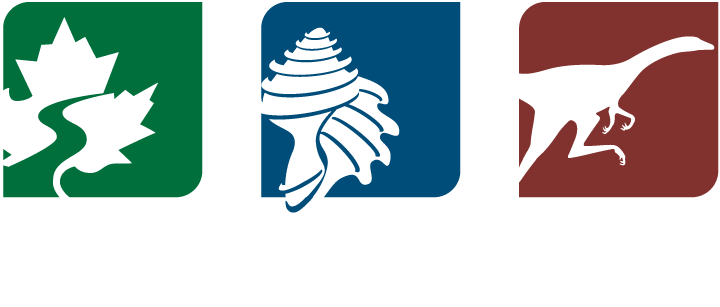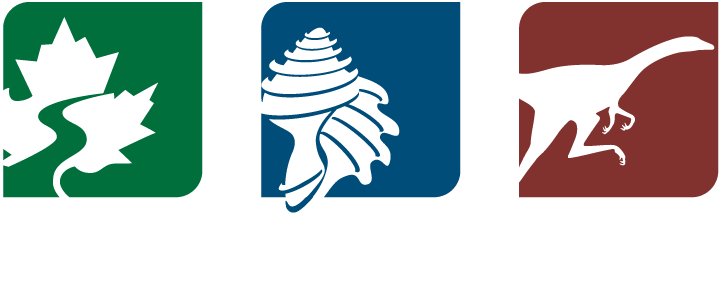Everything is Paleontology
Last updated January 16, 2020
Several years ago, after my mother responded to an acquaintance's question about my occupation by saying I was a paleontologist, the other woman asked in puzzlement, "My goodness! How did he ever become so specialized?" I am pretty sure that if my mother had said I was a physicist, chemist, or biologist, she might well have gotten a different response. To most people, paleontology is an unpronounceable, narrow, esoteric-sounding branch of human endeavor. Even many other scientists view it as off the main path of science and certainly not a "core" subject. The most familiar point of contact that most people have with the field—dinosaurs—doesn't really help this situation, since they are widely viewed as something that kids eventually grow out of rather than a serious scientific pursuit.
Life-sized paper mache model of the Jurassic armored dinosaur Stegosaurus that was built for the 1904 St. Louis World’s fair. It resided at the Smithsonian Institution’s Museum of Natural History for nearly 100 years before being transferred to the Museum of the Earth in 2014.
Physics and chemistry have long held the thrones as the king and queen of the sciences. My college chemistry text, for example, by Theodore L. Brown and H. Eugene LeMay, Jr., was entitled Chemistry. The Central Science (Prentice-Hall, 1977). Why, the authors ask in the preface, "is it that so many diverse areas of study should all relate in an essential way to chemistry?" Their answer: "chemistry is, by its nature, the central science" (emphasis in the original) because "[i]n any area of human activity that deals with some aspect of the material world, there must inevitably be a concern for the fundamental character of the materials involved."
The reductionist tradition, which has dominated science for centuries, holds that understanding comes through the search for the most fundamental physical explanations for physical phenomena. Reductionism depends on an understanding of such disciplines as chemistry and physics, which take as their domain the explication of the behavior of our physical universe at its smallest scales. In this respect, these subjects are clearly "central." All other disciplines depend on them. One might then presume that all other disciplines would be equally derived from these "central" subjects. But the fundamental nature of chemistry and physics has long been responsible for the often implicit "pecking order" among the other sciences. Those that most resemble chemistry and physics (reductionistic, and usually highly experimental and quantitative) are usually viewed as "better" than more "descriptive" fields.
In such a view, a field like paleontology is bound to seem "specialized" and very "non-central." Yet an alternative view of science—one that is now coming increasingly to the fore—shows that such a simple hierarchy of the sciences is inadequate for addressing the challenges and opportunities that society now expects science to address. A more adequate (often, called "interdisciplinary") view of how science works recognizes that all areas of science depend, to a greater or lesser degree, on all others, and a complete view of one discipline is impossible without reference to (and knowledge of) at least one other.
In this view, paleontology stands astride numerous fields of human understanding. Paleontology is among the broadest of all human pursuits, literally essential for an adequate understanding of the history (and future) of the Earth's climate, as well as its biodiversity, ocean circulation, and geochemical cycles. Fossils are key tools for the dating of rocks and the location of hydrocarbons, and for reconstructing past positions of continents and oceans (and thus for an understanding of the tectonic and seismic history of the Earth). It is now widely recognized by Earth scientists that life is one of the most important geological forces on this planet. From erosion to carbon and oxygen in the atmosphere, organisms have been profoundly affecting geological processes for several billion years. We know this in large part because of paleontology.
Fossil corals and shells that covered an ancient Devonian seafloor around 380 millions years ago.
Fossils are also the only direct evidence for the evolutionary history of humans (and almost all other organisms), and so are crucial for any understanding of evolution, which is the central idea of all biology, from ecology to medicine. Just to take one prominent current example, the billions of dollars now being spent on decoding the genomes of humans and other organisms would be wasted without the understanding that evolutionary biology—including paleontology—provides. It is, indeed, difficult to imagine another single scientific discipline that touches on more other subjects.
Cast of a Tyrannosaurus rex skull, on display at the Museum of the Earth.
An unfortunate paradox afflicts paleontology. Because fossils (most conspicuously dinosaurs) are often familiar, visually appealing, pleasantly mysterious objects, students (and the general public) are often initially interested in geology through paleontology. This can be a boon to geology departments in attracting non-majors to high enrollment courses, majors to the discipline, and public support to programs. It also, however, sometimes leads to the impression, among both aspiring students and non-paleontological faculty, that paleontology is the intellectually "easiest" branch of the discipline—qualitative, descriptive, and less rigorous than the other "real" areas of geology.
In contrast, serious paleontology students quickly learn that in at least one crucial respect, paleontology is the most difficult area of geology: paleontologists must know everything. I mean this only partly tongue-in-cheek. To be adequately trained in paleontology—that is, to be able to approach and attempt to solve a career's worth of paleontological problems—a student must be well-acquainted with all areas of geology, from geophysics and structural geology, to geochemistry and petrology, as well as most areas of biology, from anatomy, physiology, molecular biology, and genetics to ecology. Paleontology is not the easiest area of geology; it is one of the hardest.
Finally, as human beings have become increasingly (albeit belatedly) aware of the enormous—and mostly negative—effects they have had on the Earth, paleontologists can make uniquely valuable contributions to both the teaching and researching of problems of "global change." Humans are organisms, and their effects on the Earth and its systems can be most clearly seen as examples of the effects all organisms have and have had on the planet for billions of years. Paleontologists can therefore serve as the links between geology and biology departments in both teaching and research in areas at the very forefront of public attention.
In an age of limits, we cannot do everything. We must invest in the areas that give us the most bang for our buck, the most understanding for our investment of time, money, and energy. From this perspective, paleontology is an excellent investment. Paleontology isn't peripheral; it's central. Everything is paleontology.




